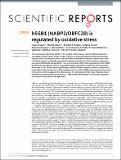hSSB1 (NABP2/OBFC2B) is regulated by oxidative stress
Abstract
The maintenance of genome stability is an essential cellular process to prevent the development of diseases including cancer. hSSB1 (NABP2/ OBFC2A) is a critical component of the DNA damage response where it participates in the repair of double-strand DNA breaks and in base excision repair of oxidized guanine residues (8-oxoguanine) by aiding the localization of the human 8-oxoguanine glycosylase (hOGG1) to damaged DNA. Here we demonstrate that following oxidative stress, hSSB1 is stabilized as an oligomer which is required for hSSB1 to function in the removal of 8-oxoguanine. Monomeric hSSB1 shows a decreased affinity for oxidized DNA resulting in a cellular 8-oxoguanine-repair defect and in the absence of ATM signaling initiation. While hSSB1 oligomerization is important for the removal of 8-oxoguanine from the genome, it is not required for the repair of double-strand DNA-breaks by homologous recombination. These findings demonstrate a novel hSSB1 regulatory mechanism for the repair of damaged DNA.
Citation
Paquet , N , Adams , M N , Ashton , N W , Touma , C , Gamsjaeger , R , Cubeddu , L , Leong , V , Beard , S , Bolderson , E , Botting , C H , O'Byrne , K J & Richard , D J 2016 , ' hSSB1 (NABP2/OBFC2B) is regulated by oxidative stress ' , Scientific Reports , vol. 6 , 27466 . https://doi.org/10.1038/srep27446
Publication
Scientific Reports
Status
Peer reviewed
ISSN
2045-2322Type
Journal article
Collections
Items in the St Andrews Research Repository are protected by copyright, with all rights reserved, unless otherwise indicated.

